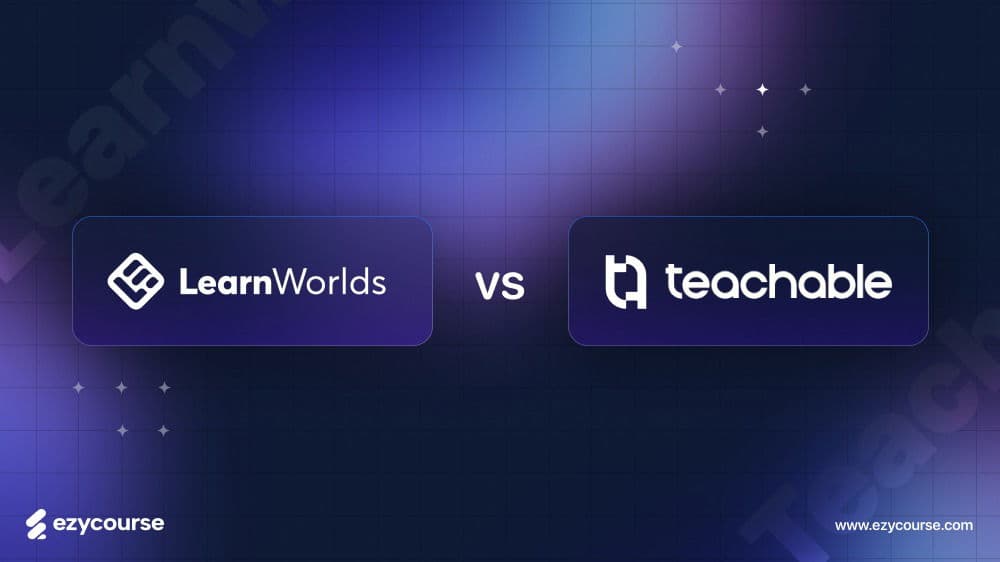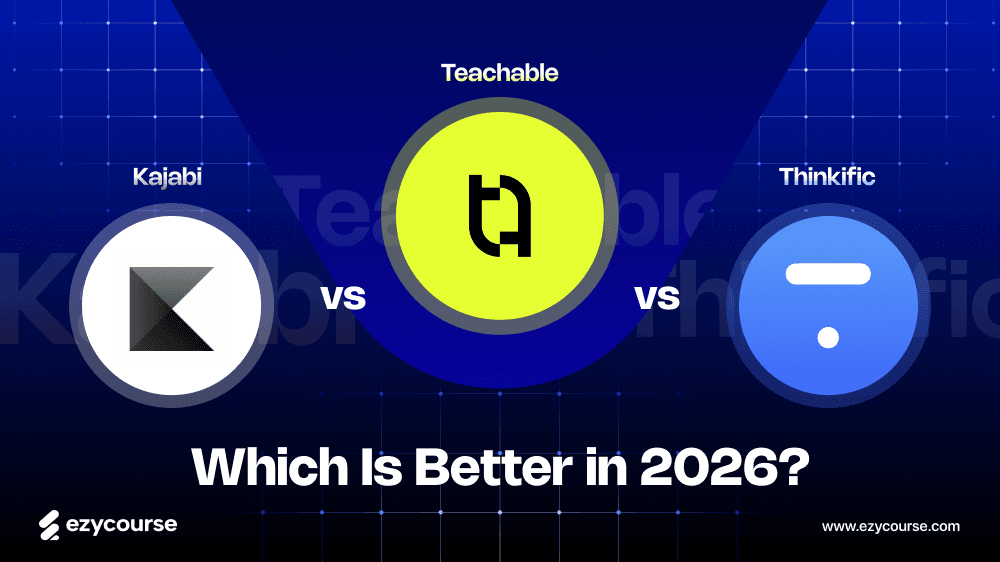You will find hundreds of platforms claiming to be Gumroad alternatives. But when you look into them, you'll see that most of them are even worse than Gumroad.
They’re either cutting commissions per sale, are full of bugs, or are not delivering what they promised on their sales page.
This can be really frustrating, right?
We get it.
Not only does this waste your time, but it also makes you wonder if there’s actually a platform out there that can replace Gumroad.
Well, there are!
After a lot of searching, we’ve finally put together a list of the top 15 alternatives for Gumroad for 2026. Just keep reading to see what's on the list along with all the good and bad points for each platform.
You’ll also find a full comparison with each platform to determine the best option for your business.
What Is Gumroad

You probably already know what Gumroad is, maybe as an existing user or after reading a few articles. But for those still curious, Gumroad is an e-commerce platform where you can sell almost anything.
By anything, we especially mean physical or digital products like e-books (except private label rights), different kinds of drawings and paintings, videos, guides, memberships, courses, software, and more.
Advantages of Gumroad
Let’s now take a closer look at why Gumroad works so well for so many:
Easy To Get Started With Gumroad
Gumroad is a platform that takes only a few minutes to set up without any cost. When we tested it by opening an account, the process was smooth.
Just upload any type of product, name it, set the price accordingly, write a short description, add a preview image, and you’re all set. This marketplace even handles all the payment processing.
Marketplace and Sales Management
Gumroad offers some clear benefits for selling products. You can sell directly without needing another platform.
As a marketplace, Gumroad has a "Discover" button that helps users find the products they want. You can manage sales and connect with your customers right from one dashboard.
A Secure Selling Environment
When you try to sell something online, what’s the most important thing you consider the most? Security, of course. Gumroad ensures that both sellers' and buyers' data is secure.
Get In Touch With Collaborators
Collaborators are those people who share profits or help make content. Gumroad helps creators work together and collaborate. This actually makes it easy to share earnings and responsibilities.
Engage Your Audience
You can also use Gumroad to send follow-up emails when someone buys a product, subscribes, or leaves items in their cart without completing the purchase.
Drawbacks of Gumroad
Now, let's look at why Gumroad might not be the best option for you. And why it’s okay to consider other choices. Drawbacks of using Gumroad:
High Fees Per Sale
One of the main downsides of Gumroad is that it charges high fees for each sale. For each sale, Gumroad takes a 10% commission.
Wait, there are more.
If you’re using their in-app feature, that jumps to 40%. Want better rankings through the "Discover" feature? That’ll add another 30% or more.
Yes, that's a hell. All these fees quickly cut into your profits.
Limited Customization Options
Imagine paying all these fees and still not having enough flexibility to customize your store. That’s exactly what happens with Gumroad.
Who wants to pay 10% per sale for a platform that doesn’t even let you personalize your storefront the way you want?
You Have to Drive Your Own Traffic
With Gumroad, you’ll need to bring your own traffic.
This marketplace doesn’t do much to promote your products unless you pay extra for that Discover feature, which, as mentioned, also comes with heavy fees.
Risk of Account Suspension
One major issue creators face is having their accounts suddenly suspended. Gumroad has a history of suspending accounts without warning, claiming they're fraudulent.
Even worse, they can take away your earnings. Because of this, some users have labeled them as "Gumroad Scammers."
Limited Integrations
Gumroad doesn’t offer many integration options with other tools. In the name of marketing they only offer some email marketing activities and integrating Gumroad with your own website.
No Live Support or Phone System
Gumroad doesn't offer live support. If you run into an issue, you won’t be able to call or chat with someone for immediate help.
So what can you do?
You’ll need to first raise a support ticket and wait for a reply from them.
What we’re really trying to say is that while Gumroad is a big name in the digital product platform, it’s just not the best option for everyone.
That’s where alternatives come in. So, let’s get into the main part.
15 Best Gumroad Alternatives for Creators and Sellers

Gumroad stores saw a 26.9% increase quarter-over-quarter in 2024.
There are over 1.6 million free and premium digital products across categories like education, tech, and design from Gumroad creators and online entrepreneurs.
This shows you can’t just depend on Gumroad to sell anymore.
The competition is intense, the commission fees are now extremely high, and there are only a few marketing opportunities.
So, let’s get serious about this.
We know you’re eager to explore some Gumroad alternatives. Here are a few options our experts recommend for you:
1) EzyCourse: Create Courses, Build Your Website, and Sell Downloads with 0% Commissions

EzyCourse is the best alternative to Gumroad which offers more features than Gumroad itself and doesn't cut a single penny from your earnings.
Let's start by introducing you to a great innovative platform.
EzyCourse is designed for all types of creators to sell courses, physical or digital products, and memberships, as well as to build good-looking websites. Is that all?
No! You really can’t sum it up in just one line.
You can create communities, sell services like coaching, and market whatever you sell, all from the platform.
There are email marketing features, landing page builders, appointment scheduling, upsells, collaboration options, and more.
Basically, you create and host anything on EzyCourse, sell it using our built-in marketing features, process payments through our integrated gateways, and then relax.
Here is a quick and straightforward tutorial video on adding and selling digital products on EzyCourse.
No fees, no extra charges. Just pick the plan that suits your needs, and you're all set to sell.
You don’t have to look for other platforms anymore if you use EzyCourse. Build your business and run it from start to finish.
Even our basic plan lets you host unlimited courses without any restrictions.
Oh, courses!
To be honest, this is where Gumroad falls short. Gumroad is not a perfect platform for course sellers. Absolutely not, as there are few customization options.
When you view courses as a buyer, it feels like just a product listing with a poorly designed sales page.
And guys!
This is the strength of EzyCourse.
It’s a powerful platform for course sellers and coaches. It offers advanced features like Categories, Certificates, Question Bank, Reviews, Quiz Submissions, Assignment Submissions, and Survey Submissions.
Each tool here is designed to improve the learning experience and give you more control.
We also let you create private spaces and see what interests your community most.
You’ll get detailed insights on each student, so you can use this data to make your courses more personalized and appealing.
Now, let’s check out what makes EzyCourse a great Gumroad alternative.
Some EzyCourse Standout Features
Let’s have a look at the key features of EzyCourse.
Create and Manage Your Courses: Create single or bundled courses, decide who can access them (Public, Private, Hidden, or Restricted), and use motivational pop ups to engage learners.
Offer unlimited enrollments, everything can be controlled from EzyCourse’s simple dashboard.
Sell Digital and Physical Products Both: EzyCourse allows you to sell both digital and physical products without the fees Gumroad charges. Keep 100% of your earnings and sell as much as you like.
Build Facebook Alike Learning Communities: Create your own learning group similar to Facebook! Share posts, run discussions, hold polls, and let members chat with each other.
Use our community engagement strategies to grow your communities and see how revenue increases.
Membership Websites Monetization: Start a membership site, set different payment options, and offer exclusive packages to your audience.
EzyCourse lets you organize everything according to your needs and earn from memberships in a structured way.
Build Websites With No Coding Skills: EzyCourse offers a drag-and-drop website builder. This will allow you to create your site without coding. Choose from over 250 templates or add custom Javascript.
Add Revenue Partner: Share revenue on any product—courses, communities, whatever works. Just set the percentage for your partner, and EzyCourse handles the rest.
You can track all your partners and transactions in one place, keeping it simple and clear.
Make Your Own Branded Mobile App: Gumroad has a mobile app, but it doesn’t offer a white-label option like EzyCourse.
With EzyCourse, you can customize the app to your website, and EVERYTHING to fit your brand with just a few simple tweaks.
Store and Track Your Videos or Audieos Easily: You may not always need a video and audio library, but EzyCourse ensures you have this feature whenever you do.
Store all your media in one place and track how they perform with analytics.
Smart Checkout with Real-Time Tracking: EzyCourse lets you track users' activity on your checkout page. You’ll be notified when someone visits or if the checkout process fails.
Account Recognition at Checkout: Our built-in advanced system of EzyCourse automatically checks if a user already has an account.
If they don’t, they can set one up right there without leaving the checkout page.
Even if they don’t complete the purchase, you’ll still have their info saved as a new user.
Flexible Payment Choices For The Buyers: Some of the users may have funding issues but we won't let you lose a single customer.
Here is how!
EzyCourse offers options for one-time payments, subscriptions, tiered pricing, and even split payments. You can also let customers pay what they want with donation-based pricing.
Built-In Email Marketing: Set up unlimited email sequences and automation to stay connected with your audience.
Like Gumroad, you’ll handle email marketing right from the platform. But this time with more flexibility to keep your community engaged.
However, you’re still about to find out all the pros and cons of using our platform. So, let's take a look.
Things People Like about EzyCourse:
You keep 100% of your earnings.
Sell digital and physical goods without any fees.
Create and manage courses with advanced features.
Build websites without any coding knowledge.
Create and customize a branded mobile app.
You can track the user's activity on the checkout page.
Use the form builder to create custom forms.
Automate workflows with built-in AI and automation tools.
Run an affiliate marketing program directly on the platform.
Store your video and audio content.
Create communities and membership sites.
Share revenue with your partners.
Use donation-based pricing.
Take advantage of built-in marketing tools.
Things People Didn't Like:
Requires a credit card to start the free trial.

Who Will Benefit Most
EzyCourse is for people who want to sell courses and digital and physical products. Creators can easily share their online courses and memberships here.
Small business owners will really appreciate our handy built-in marketing tools that will make promoting their products easy.
If you need a complete solution for selling and growing your business EzyCourse is for you.
EzyCourse Pricing (Monthly Plan):
Essential: $59/m (Best for personal creators)
Pro: $139/m (Best for professional creators)
Unlimited: $199/m (A true unlimited plan!)
Elite: $299/m (Best for large businesses)
EzyCourse Enterprise: Custom plan
*Pricing may be subject to change
EzyCourse vs. Gumroad Comparison In Chart
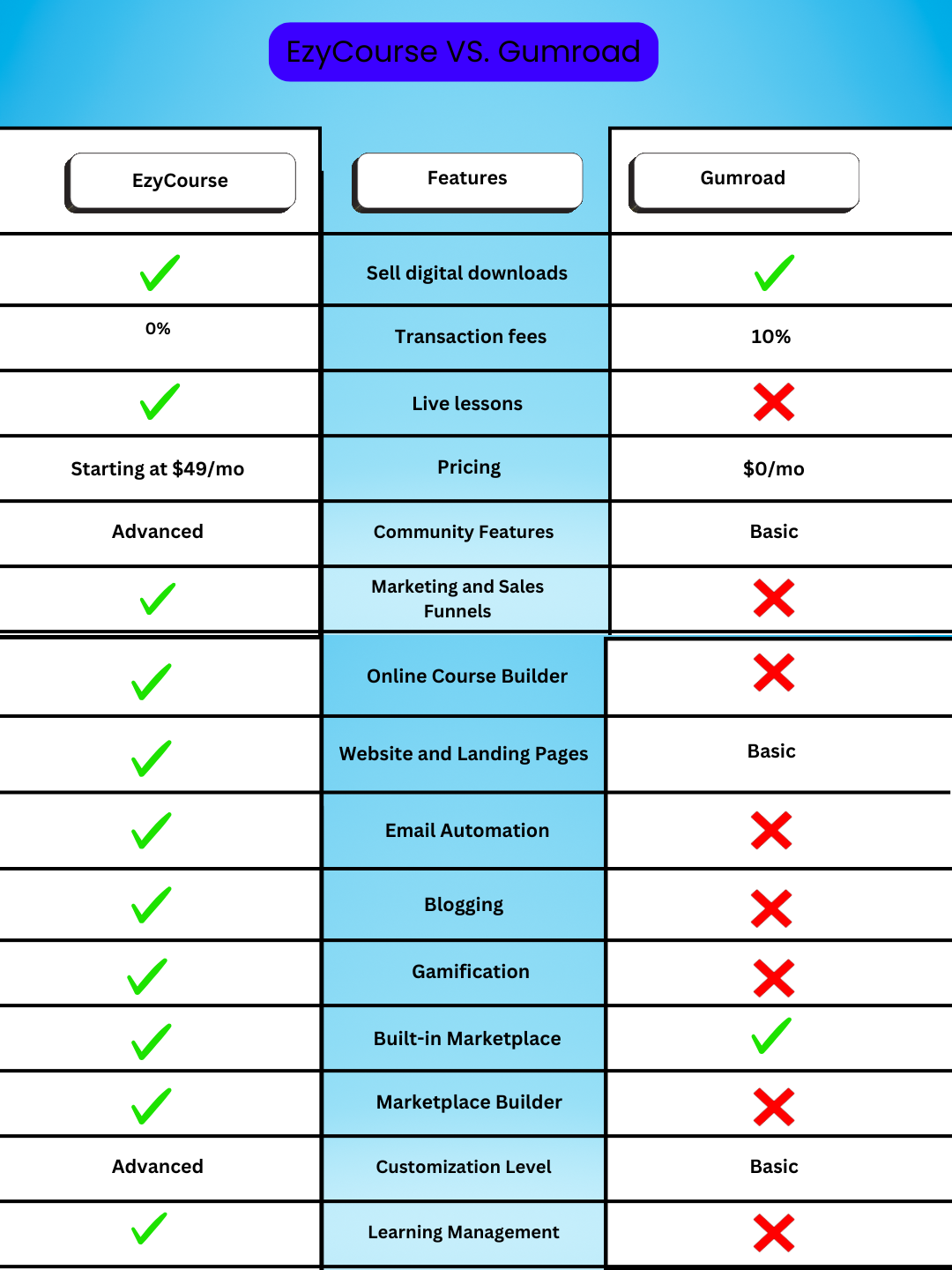
2) Podia: All-in-One Digital Marketplace
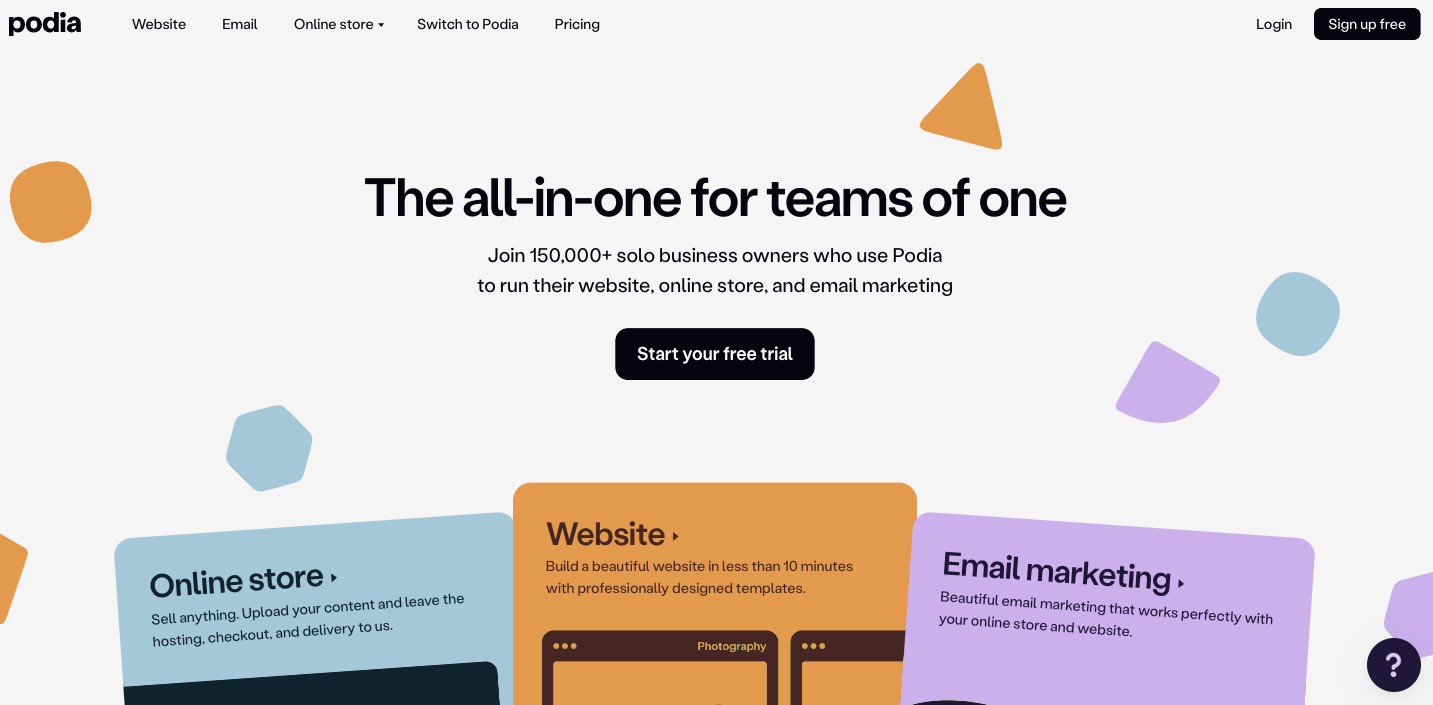
Podia stands out as a strong alternative to Gumroad. After EzyCourse, we honestly think Podia is Gumroad's closest competitor.
It provides a complete solution for creators to sell online courses, digital downloads, and memberships all in one place.
One thing to mention: when we first signed up for Podia, we felt the dashboard looked weird.
We really want them to improve the layout and UI of their dashboard, as for some, the appearance matters a lot.
However, Podia is built for creators of all kinds. It lets you easily set up online courses, webinars, and digital products.
With Podia, you can create a professional storefront, just like EzyCourse. And you don’t need any coding skills to do it.
You can build email marketing campaigns, create product pages, and even run affiliate programs to increase your sales.
Moreover, you can also create a community space for your audience to interact with each other, and that's what we tried to build.
We found their community features to be very basic. It offers very few options for running a community.
One more thing to note is that Podia offers 0% transaction fees on its highest plan, which costs $89 per month.
That's exactly why we kept Podia on our list of the 15 best Gumroad alternatives for 2026.
Now, let's look at what features make Podia a great alternative to Gumroad.
Some Podia Standout Features
Improved Management of Course Access: You can create and manage courses in one place with Podia. There are a few options like course availability control, limits on enrollments, assigning course categories, comment visibility, etc.
No Complicated Processes: With Podia, you can easily offer audio and video files, e-books, templates, and other digital products without any complicated steps.
Email Marketing with Podia: Podia includes email marketing features. You can send emails to up to 100 subscribers for free, even with the basic plan.
Community Building: We already mentioned they have a community builder. We are glad that even though they are missing many features, they at least kept the community-building option.
Affiliate Marketing: Another good thing is that with Podia, you can run an affiliate program to expand your reach.
You can set up commissions for your affiliates and track how they perform.
Webinars and Live Classes: Also, Podia lets sellers host live events to connect with their audience.
Customer Support: Podia offers support to guide you through any issues you may encounter. The dashboard has a guide on how to get started on the left side.
Things People Like:
Simple course creation tools.
Robust email marketing features.
A built-in community for audience engagement.
Flexible pricing options for products.
Easy integration of affiliate marketing.
Support for webinars and live sessions.
Things People Didn't Like:
Limited customization options compared to other platforms.
Only the higher plan offers no transaction fee otherwise 5-10% on all transactions.
No mobile app is available.
Doesn't support selling physical products.
Community building feels too basic for larger groups.
Not ideal for learning management.
Lacks assignments and gamification.
Lacks advanced marketing tools for in-depth promotions.
Who Will Benefit Most:
Podia will benefit course creators, digital product sellers, and membership site owners.
Podia Cost Breakdown:
Free: $0/m (Best for Just getting started, takes 10% on all transactions)
Mover: $39/m (Best for digital products sellers, takes 5% on all transactions)
Shaker: $89/m (Best for advanced creators, no fees)
Podia vs. Gumroad Comparison:
Do you find Podia interesting but not quite the right fit for you? Check out our blog on the 16 best Podia alternatives to find the one that meets your needs.
3) Sellfy: An All-round Platform for Creators

Alright, let’s talk about Sellfy. As its name says, it’s all about helping creators sell their stuff and make money from it.
You can also use this as a Gumroad alternative for things like print-on-demand and selling subscriptions.
Like our first two options, Sellfy also offers features like affiliate marketing, pixel tracking, email marketing, upselling, and more.
It benefits creators the most, especially if you're an influencer or someone who has a good source of traffic. You can embed the Sellfy store link anywhere and generate a good number of sales.
It’s got some neat extras like embedding your store, "Buy Now" buttons, product cards, product links, and all kinds of eye-catching things that are pretty unique.
You can even categorize your store products to keep things organized.
Though they offer many features, we still feel the lack of community-building tools, more platform integrations (there are only six), better theme customization, live support, and a built-in blogging feature.
We can say Sellfy is more focused on helping you build your store and sell products by driving traffic from different sources.
But it won't be a perfect choice if you're looking for more of a community-centered platform.
Sellfy doesn’t charge any transaction fees. However, payment processors like PayPal or Stripe do. In the U.S., they usually charge 2.9% for payment processing fees plus $0.30 for each transaction.
Sellfy Standout Features:
Coupons, Discounts, and Upselling: These are some must-have features for every product-selling platform, and Sellfy has them too.
Cart Abandonment: You can see the total abandoned carts, your potential revenue, recovered carts, and revenue in the dashboard, and then configure the follow-up emails accordingly.
Export and Import: Quite basic but worth mentioning, Sellfy lets its users export and import all recipient lists like total subscribers and buyers.
Affiliate Partner Invitation: You can invite anyone to be your affiliate partner through your store.
Things People Like:
Easy to set up and manage.
Great for print-on-demand and digital products.
Offers email marketing and affiliate options.
Customizable store embedding options.
It helps drive traffic from all sources.
Things People Didn't Like:
There aren’t many options for community building.
No niche diversification options for selling other types of digital assets like courses or memberships.
There are only six platform integrations.
The Starter plan is very limited.
Who Will Benefit Most:
We think creators who have a good audience should use Sellfy as there are multiple embedding options and it's really easy to use.
Sellfy Cost Breakdown:
Starter: $29/mo (Quite limited)
Business: $79/mo (Best value for money)
Premium: $159/mo (For Creators)
Sellfy vs. Gumroad Comparison:
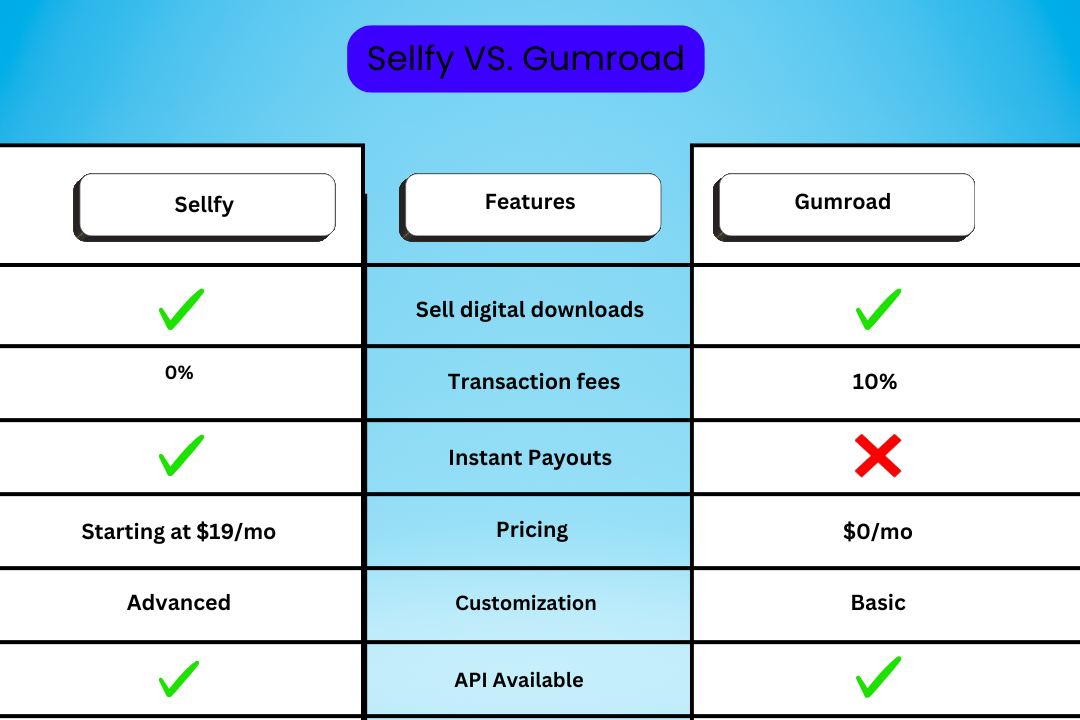
4) SamCart: Best Checkout Platform for Easy Online Sales

SamCart is another well-known Gumroad alternative that makes product selling easy with its conversion-driven checkout features.
No, it's not just a payment processor; it offers much more than that.
So far, SamCart has supported over 77,000 businesses and launched 342,000 pages. It has sold over 10 million products and processed more than 4 billion dollars. Hope you can feel its impact now.
SamCart is an embeddable e-commerce software with numerous integrations with popular platforms like WordPress, Shopify, Mailchimp, and payment processors like PayPal and Stripe.
This is where SamCart surpasses others in online product selling.
However, some of SamCart's most important features are highlighted below.
SamCart Standout Features:
Selling Digital Products: You can sell digital products, courses, subscriptions, PDFs, and more. Learn how to sell digital products online in 4 simple steps.
Get Sales from Anywhere: SamCart offers various checkout features that can be embedded anywhere online, integrated into any page, and include express checkout options.
Order Bumps and Add-ons: You can increase your sales using SamCart's order bumps, add-ons, and upselling features.
Reporting, Payments, and Integrations: SamCart integrates with many payment gateways and has a strong reporting feature.
Things People Like:
It’s great for selling digital products, courses, and subscriptions.
Checkout pages can be placed on any website easily.
Upselling and order bump options increase revenue.
Increase conversion rates.
Integrates well with WordPress, Shopify, and Mailchimp.
Simple to track and manage sales with good reporting tools.
It’s easy to use, even for people new to e-commerce.
Things People Didn't Like:
Limited payment gateways (only PayPal and Stripe).
No built-in storefront unless you use a third-party platform.
Templates are similar and hard to customize.
No real-time preview while editing checkout pages.
It can be expensive for small businesses.
Many users report issues with canceling subscriptions.
A few design options to match your brand perfectly.
Who Will Benefit Most:
SamCart is perfect for businesses that want simple checkout options without building an entire store.
SamCart Cost Breakdown:
Launch: $79/mo
Grow: $159/mo
Scale: $319/mo
SamCart vs. Gumroad Comparison:
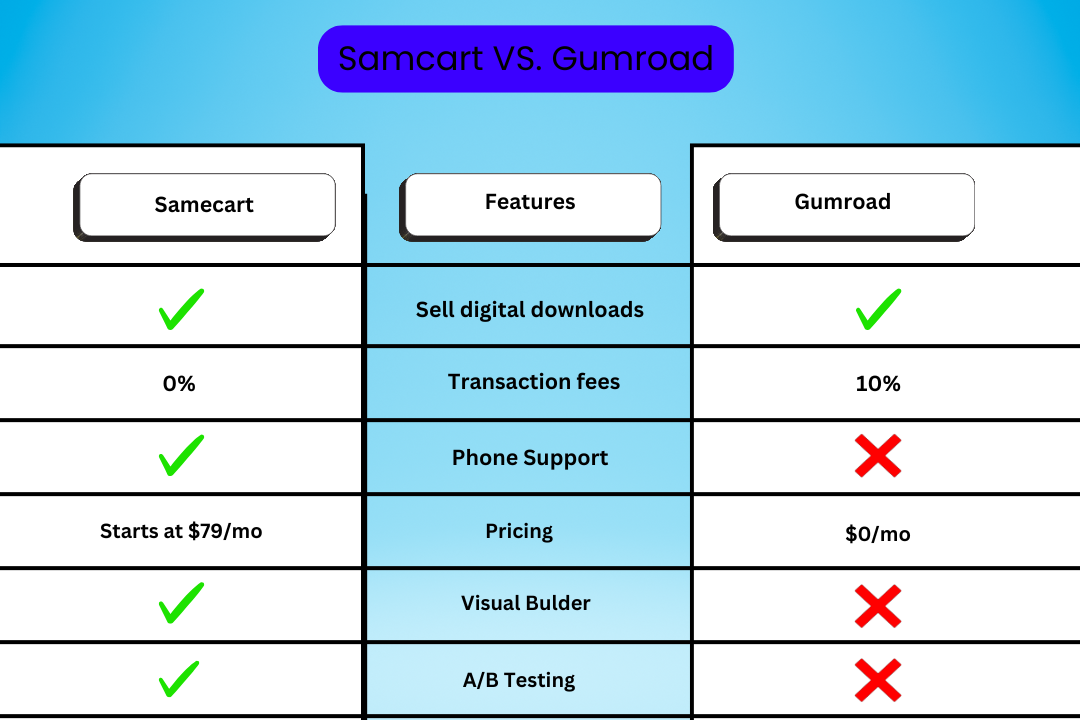
We have a detailed blog on the 10 best affordable SamCart alternatives, which is worth checking out.
5) Easy Digital Downloads: Best WordPress Plugin for Digital Downloads
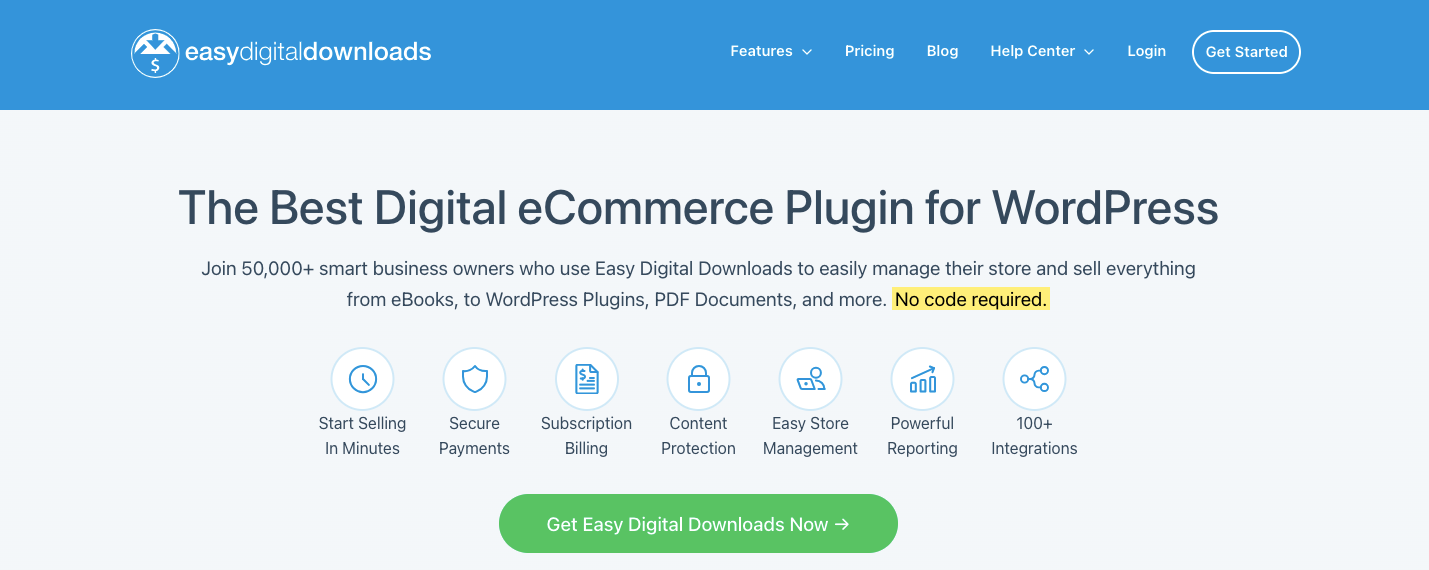
Easy Digital Downloads is an e-commerce WordPress plugin that helps its users manage WordPress stores easily.
We have found it to be more powerful than SamCart. It integrates with over 100+ platforms like OptinMonster, Slack, Stripe, dropbox, etc.
The best part is there are no transaction fees, no monthly fees, or listing fees.
What's even better is they support unlimited products and unlimited transactions.
Just imagine, you are doing unlimited sales with Gumroad, you would be crying in the corner now.
The downsides here could be the extra cost of WordPress hosting, other plugins for your needs, themes, and more. However, let's see what key features make it a good Gumroad alternative.
Easy Digital Downloads Standout Features:
Shopping Cart Customization: Easy Digital Downloads support Stripe and Paypal. It lets you customize your action button texts, then save it to your cart and in the end complete the purchase by registering or as a guest.
Reporting and Order Management: You can track your store's total sales, refunds, assigning customer details, and daily insights all right from the WordPress dashboard.
Customer Management and Organization: Another handy feature of Easy digital downloads is that it helps you manage your store orders and customers. You can track your customer's activity right after they create their account.
Things People Like:
No transaction, monthly, or listing fees.
Integrates with over 100+ platforms.
Unlimited products and transactions are supported.
Full control over shopping cart customization.
Detailed reporting and order management right in WordPress.
Simple tools for tracking and managing customers.
Easy to set up and use for WordPress users.
Allows both guest and registered checkouts.
Supports over six payment methods.
Enables vendor management and review collection.
Things People Didn’t Like:
Requires extra WordPress hosting
Costs rise with additional plugins and themes
Some features need premium add-ons
Not suitable for non-WordPress users
The learning curve for complete beginners to WordPress.
It can be heavy on resources if your store grows large.
Lack of a native storefront.
Who Will Benefit Most:
It works best for high-volume sellers comfortable managing WordPress plugins and hosting on their own.
Cost Breakdown:
Personal: $99.50/year
Extended: $199.50/year
Professional: $299.50/year
All Access Pass: $499.50/year
Easy Digital Downloads vs. Gumroad Comparison:
6) ThriveCart: Increase Your Shops Cart Value

ThriveCart is an online shopping cart and sales platform. It helps businesses sell digital and physical products, subscriptions, and services.
Gumroad and ThriveCart serve different purposes and offer unique features. But both make it easy for creators to sell and deliver their products.
Both have features like upsells, bumps, and links. However, we like ThriveCart more. It offers better customization than Gumroad. It also creates funnels and works well with other tools.
Gumroad is easy to use and offers features that ThriveCart doesn’t. But ThriveCart has a handy follow-up feature that tracks abandoned carts, and refunds, and gives business insights.
Plus, there are no transaction fees, and it works well with any WordPress site.
We think ThriveCart is a good deal since it costs a one-time payment of $495.
But keep in mind that it only includes a one-page sales funnel builder. If you need to connect it with other website builders, the overall cost can increase.
What more unique features does it have? Let's find it out below:
ThriveCart Standout Features:
Profit Boosters: When it's about online selling, we all want a higher conversion rate. That’s what ThriveCart's profit boosters can help you achieve.
You can create upsell funnels with just one click. Offer your visitors courses, subscriptions, and trials.
Bump Offers: ThriveCart's bump offers let you present high-converting offers during each checkout. This will increase your profit for sure.
One-Click Upsell Funnels: The one-click upsell funnels are perfect if you want a solution that suggests similar products to your customers. They make it easy to offer related products.
Embed Anywhere: You don’t need to worry about cart embedding. You can embed your carts anywhere on your website with this feature.
Integrations: We love that ThriveCart offers many integrations. It works with all the important platforms. You can connect payment processors, Zapier, fulfillment services, membership platforms, autoresponders, and more.
Things People Like:
Quick and easy to set up and start selling.
One-click upsells.
Bump offers to increase revenue with minimal effort.
Works with many platforms and tools.
You can embed carts anywhere on your site.
Affordable pricing with one-time costs and no transaction fees.
Things People Didn't Like:
Limited features are available for beginners who need more guidance.
It requires some setup to integrate third-party tools fully.
It is not ideal for those selling physical products with complex shipping.
The pricing can still be high for small businesses despite lifetime access.
Lacks built-in marketing tools like email automation.
The interface could be more user-friendly.
People often complain about their support.
Who Will Benefit Most:
ThriveCart isn’t designed to build a complete website. It’s best for setting up simple, customizable checkout pages and single-page sales funnels.
So, it’s ideal for sellers looking for basic features.
Cost Breakdown:
Lifetime: $495
ThriveCart Pro: $690
ThriveCart vs. Gumroad Comparison:
7) Shopify: All-In-One Platform For E-Commerce Store Creation

Another big name for e-commerce platforms is Shopify. This popular tool lets anyone set up an online store to sell products.
In Q3 of 2024, Shopify stores grew by 6.8% from the last quarter and 33% from the same time last year.
Why?
Because Shopify provides a full set of tools for product management, payment processing, and shipping.
Now, to name the differences between Gumroad and Shopify, we can list many.
Gumroad mainly targets individual creators and smaller businesses, while Shopify serves both individuals and larger companies. Shopify stands out with more than 8,000 integrations and tools.
Well, we know this number is huge. It also allows for a highly customizable storefront with various themes and layouts.
You might know Gumroad is primarily focused on direct sales through its platform and has limited integration with other channels.
On the other hand, Shopify is not just for creating a shop. You can grow your shop and manage it from A to Z within the platform.
Shopify Standout Features:
Free and Paid Themes: We think themes play an important role in product sales. Shopify offers stunning free and paid themes for its users. There are 200 themes on Shopify, but only 13 are free.
Multiple Sales Channels and App Store: Shopify lets you sell across different channels and has an App Store with over 8,000 integrations. From your dashboard, you can track each sale easily.
One-Page Checkout, Rewards, and Discounts: Shopify offers a one-page checkout. Also, there are options for rewards, discount codes, and shipping settings.
Built-In Marketing Tools: Shopify provides built-in marketing tools, so you won’t need to rely heavily on third-party apps.
You can use branded email templates for marketing, set up automation flows for specific tasks, work with influencers, and make content, products, and your store SEO-friendly.
Shopify Point Of Sale: This is worth mentioning as the POS system is crucial for making sales in person. Luckily, Shopify has this solution too.
Payment and Shipping: Shopify has built-in payment processors for users and shipping products is now easier than before.
Things People Like:
Offers a wide range of customization options.
Various themes, templates, and plugins are available to use.
Supports a variety of sales channels like social media, in-person, and online marketplaces.
Provides multiple payment options.
Reach a global audience without much hassle.
Thousands of app integrations.
Easy to use and user-friendly dashboard.
Things People Didn't Like:
Only a few free themes.
Shopify charges transaction fees unless you use their payment gateway.
Less affordable for those with limited budgets.
Additional costs for paid apps, themes, and third-party integrations.
Custom reporting and analytics are only available in higher-tier paid plans.
Adding too many apps can slow down your store.
Who Will Benefit Most:
Shopify is suitable for any type of business and sales. However, you need a sufficient budget to afford the highest plan. Otherwise, it might not fit every business need.
Cost Breakdown:
Basic: $19/month (for solo entrepreneurs)
Shopify: $49/month (for small teams)
Advanced: $299/month (for scaling businesses)
Plus: $2,300/month (for complex needs)
Shopify vs. Gumroad Comparison:
8) WooCommerce: WordPress E-Commerce Plugin

WooCommerce is one of the most popular plugins for WordPress. It helps online sellers, developers, and regular WordPress users set up e-commerce sites quickly.
Right now, over 6 million sites are actively using WooCommerce, and around 8.6 million sites have tried it at some point.
WooCommerce is totally free to use with WordPress.
This makes it budget-friendly, though Shopify’s market share (26.2%) is a bit bigger than WooCommerce’s (20.1%).
With this powerful WooCommerce WordPress plugin, you can create your store and sell anything through your online business.
It has a marketplace where you'll find literally every solution for your store needs, like extensions, themes, payment processors, customer service, and marketing-related tools. Though most of them are not free.
Even if you want to outsource the work related to setting up a shop with WooCommerce by hiring freelancers, you can do it too.
It's an absolute GEM platform for business people.
So, you might now understand why it's on our list of 15 best Gumroad alternatives.
WooCommerce isn't just a Gumroad alternative. It’s also a solid competitor to Shopify.
So, what makes WooCommerce a strong option alongside Gumroad? Let’s check out its standout features:
WooCommerce Standout Features:
Simple Setup and Easy to Use: Honestly, nothing beats a user-friendly dashboard and easy setup. Most users agree that the WooCommerce plugin is easy to use. You just need to install it and then take 5 minutes to understand the dashboard.
For the rest, you’ll find tons of guides on WordPress.
Customization and Product Management: With the WooCommerce plugin, customization and product management are organized. This will definitely help you grow your sales.
There are lots of product customization options, like assigning categories, tags, names, prices, etc.
Order Management: WooCommerce is the perfect plugin for people who love WordPress and want to create their own ecommerce website, something similar to Gumroad for online sales.
And to do that, you’ll definitely want order management features. Luckily, WooCommerce has that too.
Analytics and Tracking Sales: Some say WooCommerce has basic analytics, while others find it advanced. Whatever they say, we can’t deny that their analytics are as helpful as other major features for sellers.
Things People Like:
It can grow easily with your business.
Setting it up costs less than many other platforms.
You can customize it with many plugins and extensions.
It’s quick to install and easy to use
No coding is needed.
The support team is helpful and responsive.
There are many themes to help you create a unique design.
Integrations with accounting, POS, and warehouse systems.
Things People Didn't Like:
Doesn’t come with built-in legal texts for regions outside the U.S.
Primarily focused on U.S. market needs and regulations.
Compatibility issues can arise.
Not all themes and plugins are free.
Requires additional plugins for some advanced features.
Who Will Benefit Most:
We suggest using WooCommerce to build e-commerce websites on WordPress.
However, the costs can be high, and free resources are limited. So, you'll need to budget for essential plugins and support to get the most out of it.
Cost Breakdown:
WooCommerce is a free WordPress plugin. But there are some premium plugins that you have to use with WooCommerce.
WooCommerce vs. Gumroad Comparison:
9) Payhip: Easy Storefronts for Independent Sellers
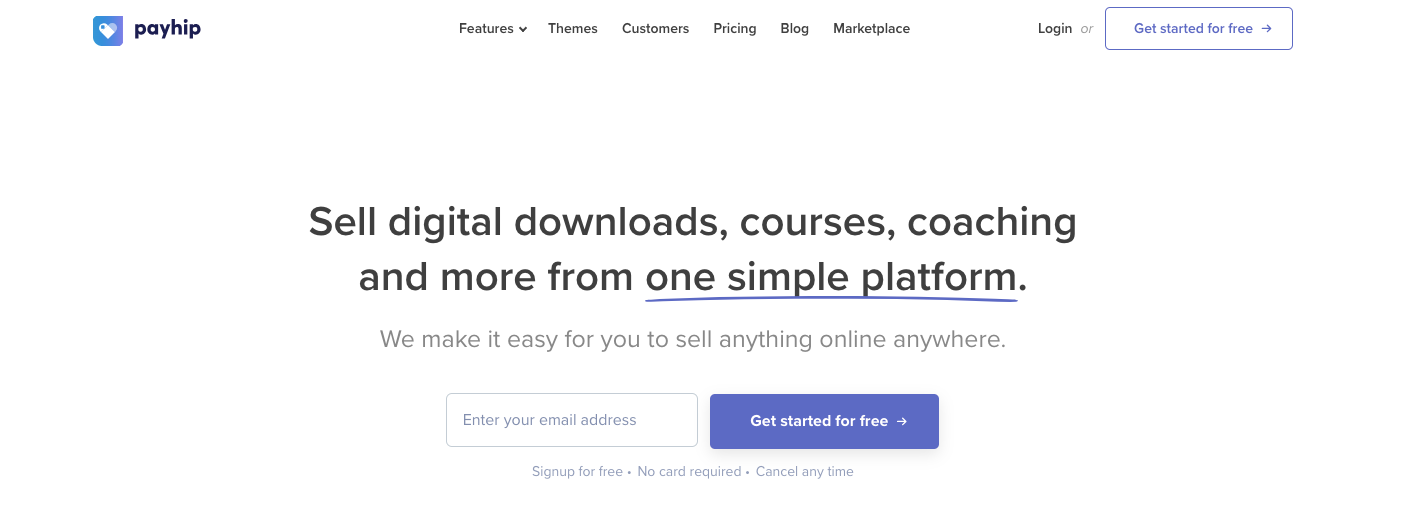
Many of you have asked us to include a simple but effective Gumroad alternative, so here it is!
Payhip is a straightforward e-commerce platform that lets you sell online. While most people use it as a Gumroad alternative for selling digital goods, it can actually be used for other purposes too.
When we tested it, we found the UI to be very smooth.
Regarding transaction fees, yes, they do charge lower fees per sale on the free and Plus plans. However, on the highest Pro plan, they charge 0 transaction fees from sellers.
Feature-wise, this drag-and-drop website builder is quite user-friendly. Everything feels organized, so you won’t feel overwhelmed.
In the menu bar, we found options like products, stores, analytics, marketing, and customers displayed clearly. You just click on each button to set up your store.
While the marketing tab doesn’t offer as many features as EzyCourse, it includes basics like mailing list builders, cross-selling options, affiliate setups, and referrals.
Let’s check out the other important features they offer.
Payhip Standout Features:
Marketing of Your Products: As mentioned previously, Payhip offers basic marketing features like email list building, affiliate and referral setup, coupon activation, etc.
To use the email list builder, you have to add your email service provider's API key, though.
Store Customization: Now, talking about the features Payhip offers to customize your store, we couldn't find anything special here either.
They let you connect your domain, have an option to write and publish blog posts, and then set up your store.
In fact, the themes offered for free are not very attractive. We can't blame them, as we already said Payhip is a simple and basic store builder.
Analytics for Everyday Sales Tracking: You can see your store's daily or date-based performance by filtering and adjusting settings in the Analytics dashboard. They let you track sales, views, unique customers, total orders, visitor sources, visitor map views, etc.
Customer Follow-up: We like this Payhip feature a lot. This feature lets you send daily email updates to your customers, generate a sales report for yourself, and also show how many followers you have gained per day.
Customers will be able to subscribe to newsletters or updates. You just have to click on the "Customers" button to get in touch with them.
Things People Like:
Easy-to-use and user-friendly dashboard.
Sell multiple types of digital products.
A free plan is available to start at no cost.
Embeddable stores on any website.
Opportunity to write blogs.
Free themes are available for use.
Doesn’t require much technical knowledge to use Payhip.
Allows selling unlimited products.
Payment gateways integrated.
Own marketplace available for sellers.
Things We Didn't Like:
Even though it lets you write blogs, the SEO features are limited.
Free themes are not very attractive.
They take a 5% and 2% cut per transaction unless you choose their highest plan.
You need to bring your API key to use email marketing features.
Who Will Benefit Most:
Digital creators will benefit most from using Payhip. If you’re a beginner and looking for a free option to start, this could be ideal. Gumroad takes 10% while Payhip takes 5%; that’s the difference.
Cost Breakdown:
Free Forever: $0 /mo (+5% transaction fee)
Plus: $29 /mo (+2% transaction fee)
Pro: $99 /mo (No transaction fees)
Payhip vs. Gumroad Comparison:
10) Teachable: The Educator’s Choice

Teachable is another learning management system that lets users create and sell online courses, digital products, and memberships, as well as build websites for multiple purposes.
However, EzyCourse is a perfect alternative to Teachable and offers more features.
Talking about Teachable, there are over 29,185 (as of 2024 Q4) live stores operating. Most of these website owners are selling courses and educational products (35.4%) through their stores built with Teachable.
Now, the question is whether you should pick Teachable as an alternative to Gumroad and EzyCourse or not.
To understand the differences fully, we have tested both platforms.
The thing is, Gumroad is not a dedicated course-selling platform. Teachable is not at all affordable for small business owners, and the customization options are limited too.
They restrict your total sales per month, students enrolled in courses, the total number of products, and more.
If we talk about EzyCourse, Teachable offers some close features but less, as our platform is very affordable for individuals and enterprises.
We offer unlimited members, and products to sell without any transaction fees. To understand more about the differences, go through this comparison blog of EzyCourse vs. Teachable. However, it's time to talk about what features they offer.
Teachable Standout Features:
AI Features: Teachable helps creators outline their course content through AI.
Yes, you can use ChatGPT for this use case too. But their AI is also capable of creating in-depth quizzes in a minute. There is an AI translation feature too.
Multiple Payment Systems: One thing we have noticed in Teachable is it lets buyers buy first and pay later. People might wonder why one should get access first and pay later when they can literally call it a "trial period."
However, they also offer upsells and bumps within this feature.
Track Progress: As usual, a teaching platform lets creators track their student's activities, learnings, engagements, etc. Teachable has this option too.
Things People Like:
Simple but effective features for beginners, like coupons, affiliates, and analytics.
Focused mostly on course creators.
Tracks learner’s activities, engagement, course completion levels, etc.
Create topic-based advanced quizzes in a minute.
Certificates after successful course completion for learners.
Create multiple types of pages, like sales, checkout, thank you, etc.
Options to increase sales via upsell offers.
Things People Didn't Like:
Some claim their email marketing features are not helpful enough.
Not a complete solution for course creators and other online sellers.
Expensive but feature wise offers so little.
Who Will Benefit Most:
We think Teachable is great for course creators. Other people can use it too, but it doesn’t have a lot of features for different niches.
So, if you're focused on teaching, this might be a good fit!
Just to mention, EzyCourse has a lot more features for course creators than Teachable. Also, the pricing is lower than the Teachable basic plan. So, EzyCourse might be the best choice if you want more value.
Cost Breakdown:
Basic: $39/month (Basic tools and support to start your business.)
Pro: $119/month (Advanced tools and better support to help you grow.)
Pro+: $199/month (More products and custom user roles for businesses that are growing fast.)
Teachable vs. Gumroad Comparison:
Find out the 15 best Teachable alternatives to get started with today.
11) Thinkific: Create, Sell, and Market Digital Products

Different types of products need different platforms to sell well. Some platforms are better for digital goods, while others work best for physical goods.
Many people choose Thinkific to make and sell online courses. Is it just another choice for course creators?
Yes, but Thinkific stands out with its special AI features for users. But that doesn't mean AI will create your video course and something like that.
Thinkific just helps in outlining the course content and then making the content which is actually done by you.
However, Thinkific is growing fast, so why not consider it as a Gumroad alternative? With it, you can also sell any kind of digital goods, downloadable stuff, and whatever you like to sell.
It actually has many features that are incredibly useful for online selling.
You'll appreciate their automated payment feature, among others. Thinkific offers many unique features so let's check out some of them.
Thinkific Standout Features:
No-code website builder: Thinkific also has a no-code website builder for selling learning products. They offer ready-made themes for website building that you can customize according to your needs.
Growing community engagement: You can create various types of websites, including communities, allowing for better visitor engagement. This can include giving members access to specific content, hosting events and sessions, and more.
App Store of Thinkific: You’ll be surprised to know that Thinkific offers 80+ apps in its app store. Some are for marketing, bookkeeping, and other uses.
Take scheduled classes: Another great feature of Thinkific is the ability to schedule class times before starting. It’s a helpful feature for both learners and educators.
Things People Like:
Courses can be built quickly with the help of AI
Offers both self-paced and scheduled learning options.
It lets you have live lessons so students can interact in real time.
Add quizzes and certificates for students after they finish the course.
Track and reward how well students are doing.
It supports different types of content like videos and images.
There are white-labeled mobile apps for sellers.
You can find various ways to earn money with extra resources.
You have full control over your branding, content, and customer information.
Things People Didn't Like:
Limited marketing features.
Built specifically for course creators and learners.
Expensive for individuals and small businesses.
Thinkific’s features can feel overwhelming for users seeking simplicity.
Who Will Benefit Most:
Thinkific is great for educators and coaches who want to create courses and sell them online by creating their own websites. If you’re also checking out Teachable, this one’s worth a look too.
Cost Breakdown:
Basic: $49 /mo
Start: $99 /mo
Grow: $199 /mo
Expand: $499 /mo
Plus: Custom Pricing
Thinkific vs. Gumroad Comparison:
We've already listed our top 11 Gumroad alternatives above. Now, it's time to give you an idea of the next 4 platforms on the list. But rest assured, the top 11 are the ones most people choose as Gumroad alternatives.
12) E-junkie: Easy To Use Gumroad Alternative
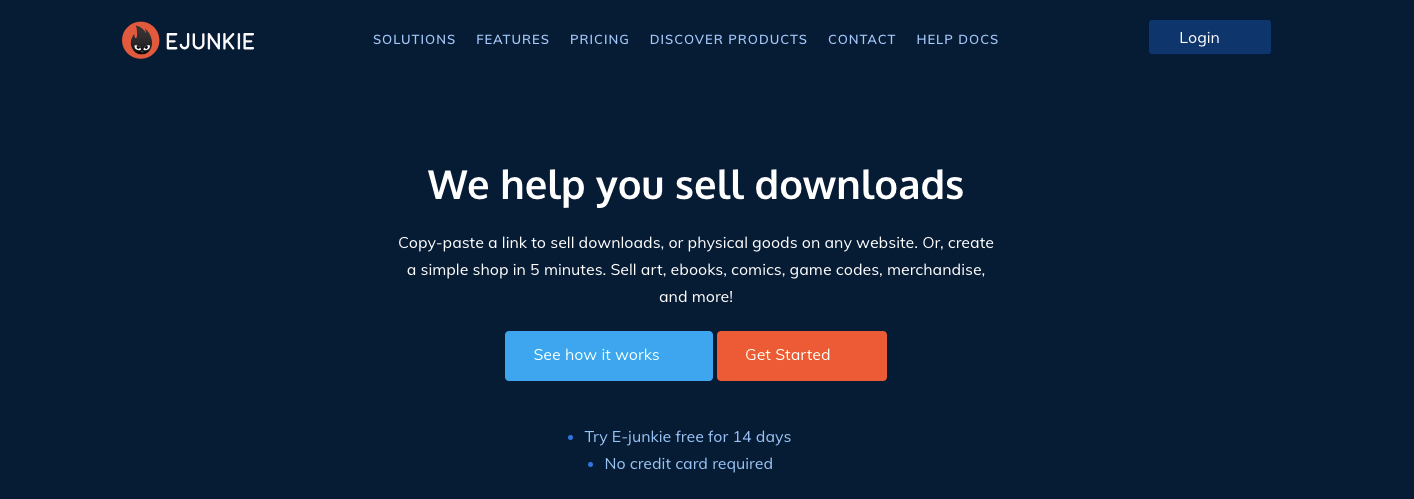
E-junkie could be one among many good, not bad, Gumroad alternatives. You can sell ebooks, comics, audio and music, photography, digital art, and many more things.
This was founded in 2003, while Gumroad was started in 2011 by Sahil Lavingia. This means E-junkie’s journey has been longer than Gumroad.
But to be honest, you will face many issues while running a store with E-junkie. Another option E-junkie gives sellers is to start selling in their marketplace.
However, people complain a lot about their server not responding, and sometimes the website goes down. The good thing is they don't charge transaction fees.
13) Checkout Page: Simple Checkout Page Builder

While searching for some top Gumroad alternatives on Google, we found one of the simplest checkout page builders.
Checkout Page is an embeddable, easy-to-use checkout page builder that will fulfill your quest for a good checkout page builder. They don’t charge transaction fees.
You just have to take the free trial and create a no-code custom page. Design it as you want, and connect it to your Stripe account. That’s it.
You can also create event pages and custom forms with this tool. When selling event tickets, you can create custom ticket types like Early Bird, General Admission, VIP, etc.
14) Memberpress: The Only All-In-One Membership Plugin For WordPress

The next one we have on the list is quite popular among WordPress users, specifically those who love memberships. If you want to build a membership-like website but with WordPress, then this is the one.
MemberPress is a popular WordPress plugin to run a membership-based site.
If you’re selling online courses, gated content, or community memberships, it’s a good choice.
You can set up different membership levels, restrict who sees what content, and easily handle subscriptions, payments, and renewals.
It integrates with popular email marketing tools and offers automation features too. It’s super flexible and works well with other WordPress tools.
We liked how easy it is to create a unique membership site focused on user engagement through Memberpress.
15) Bigcommerce: Create E-Commerce Stores Without Coding
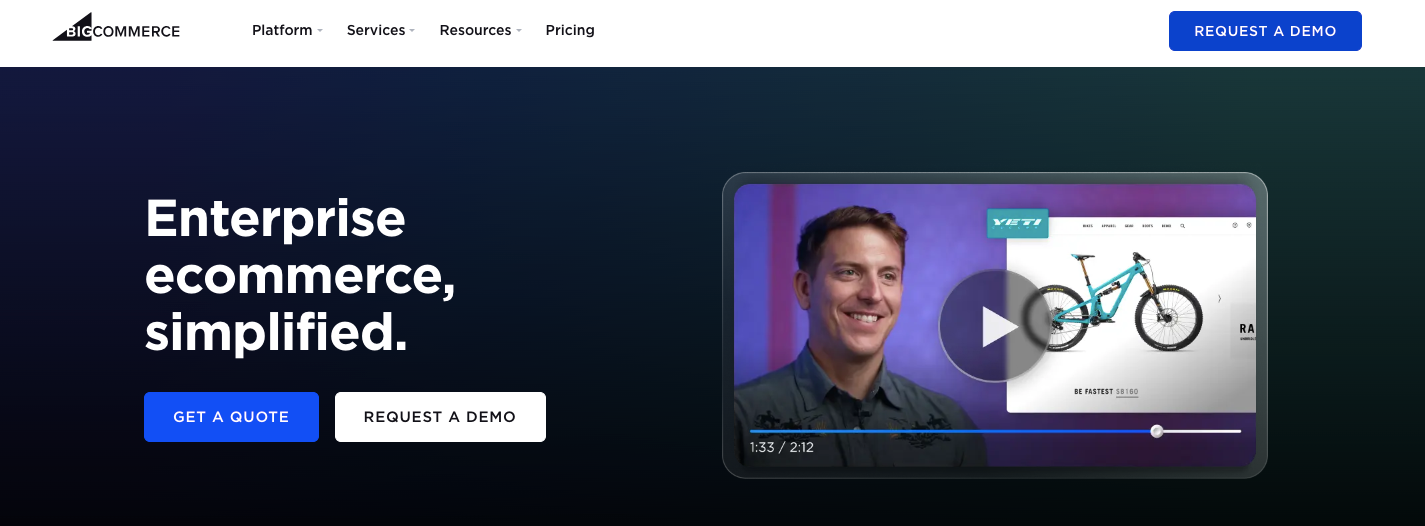
You’re about to read the last one of our top 15 Gumroad alternatives for 2026. As the name hints, can you guess what it’s for? Most likely, yes.
BigCommerce is for creating e-commerce stores without needing coding skills. However, it’s more than just an e-commerce store builder.
It offers a page builder, attractive themes with customization options, a customizable checkout, mobile responsiveness, and even integrates with WordPress.
This means WordPress users can use BigCommerce as a middleware with WordPress.
One thing that makes BigCommerce stand out from other site builders is its focus on technical aspects. Store setup, SEO, and merchandising are some of its top priorities.
If you’re looking for a Gumroad alternative specifically for e-commerce, BigCommerce might be the right choice.
Which Gumroad Alternative Fits Your Needs Best?
You can be sure that our listed best 15 Gumroad alternatives are what everyone is picking. But obviously, one is ahead in this game, which is none other than EzyCourse.
By offering tons of crazy and useful features, keeping pricing affordable for all, and functioning as mentioned on the homepage, YOU definitely need to try this one today.
And to do that, you just need to sign up for the trial.


